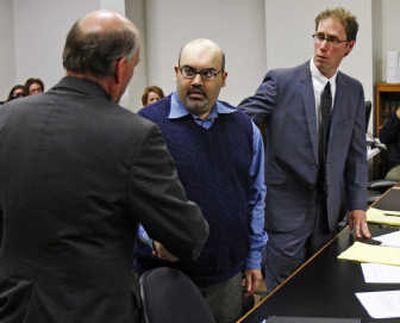Mistrial in Jewish center killing

SEATTLE – A judge declared a mistrial Wednesday in the case of Naveed Haq, who stormed into a Seattle Jewish center two years ago and shot six women – one fatally – as he ranted against Israel and the Iraq war.
King County Superior Court Judge Paris Kallas ended the jury’s deliberations in their eighth day. The jurors had indicated in questions posed to the judge that they were hopelessly deadlocked and struggling to determine whether Haq, 32, was not guilty by reason of insanity, as he claimed.
The jurors reached a partial verdict on only one of the 15 counts against Haq, finding him not guilty of attempted first-degree murder of one of the women, but they couldn’t agree on the lesser charge of attempted second-degree murder or any of the other 14 charges, which included murder.
Haq held a teenage girl at gunpoint to force his way into the Jewish Federation of Greater Seattle on July 28, 2006. Once in the second-floor office, he began railing against U.S. policies and opened fire when someone tried to call 911. He shot some people in their cubicles, some in the hall and one, Pamela Waechter, fatally as she fled down a stairwell.
An emergency operator eventually persuaded him to surrender.
Prosecutors quickly announced they hope to retry Haq this year, and representatives of the Jewish Federation of Greater Seattle expressed their disappointment at the mistrial.
“There is no argument Haq killed Pam. There is no argument he viciously shot five others. There is no argument that he made anti-Israel and anti-Semitic statements. Somehow, all this was not enough,” said Jewish Federation President Richard Fruchter.
During the six-week trial, prosecutors did not dispute that Haq had mental problems and struggled to make friends or hold down jobs. But he knew right from wrong, could tell what he was doing, and wanted to get his message out, they said.
They noted that Haq planned the shooting for days, drove from his Tri-Cities home to Seattle the morning of the shooting, and hid in the building’s foyer to avoid detection.
Haq’s lawyers, however, argued that he had a long history of mental illness that had recently been worsened by a change in his medication. A defense expert diagnosed him as having bipolar disorder with psychotic tendencies.
In written questions to the judge, the jurors asked for further clarification of the legal definition of insanity in Washington state. Kallas declined to help them, saying she could not answer beyond what was provided in their instructions.
King County Prosecutor Dan Satterberg said none of the survivors of the shooting were looking forward to testifying again, but they will if that’s what it takes.
“They have to think about their wounds, their physical and emotional wounds, every day,” he said. “The experience of testifying made this a real emotional rollercoaster for them.”
Waechter, 58, was the director of the Jewish charity’s annual fundraising campaign. The other victims were Layla Bush, Cheryl Stumbo, Christina Rexroad, Carol Goldman and then-pregnant Dayna Klein, who took a bullet in her arm as she protected her fetus.
If found guilty, Haq would have been sent to prison for life, without possibility of release. While presenting his insanity defense, Haq’s attorneys said he poses a risk to society and should instead be locked in a state mental hospital for the rest of his life.